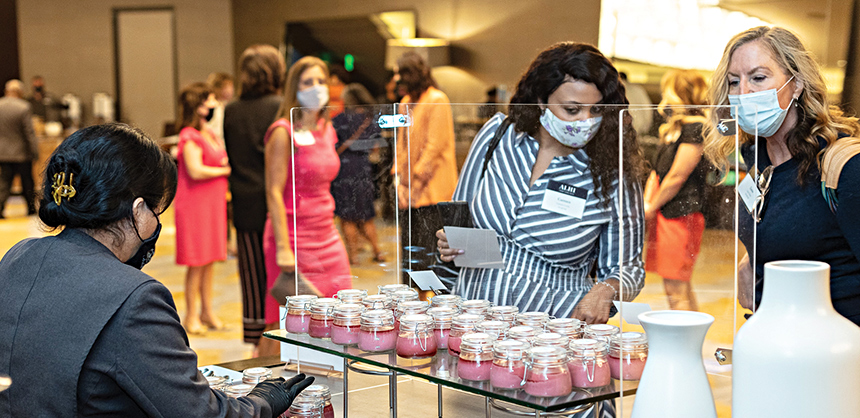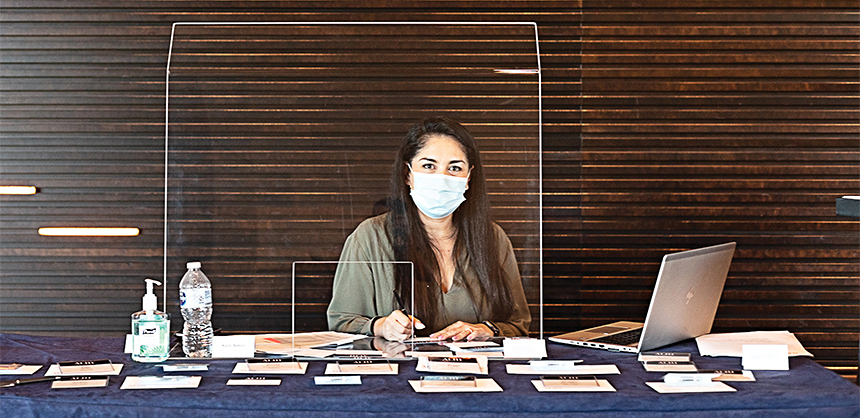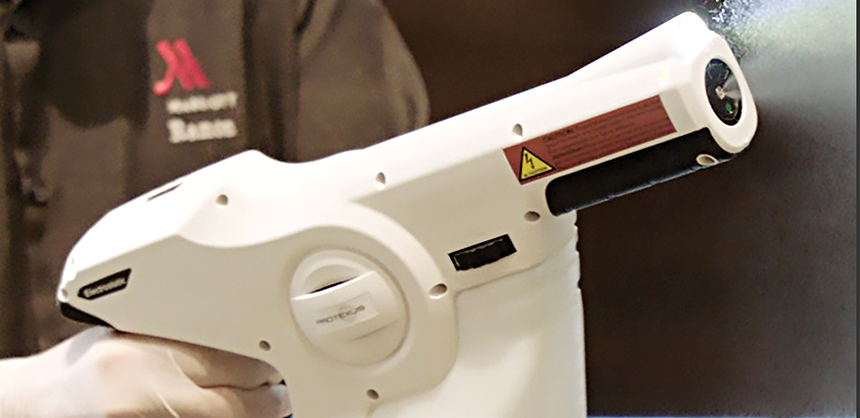Getting Back To MeetingsSeptember 24, 2020
Venues Adapt to Cleaning Standards and Assure Attendees That They Can Return Safely By David SwansonGetting Back To Meetings
Venues Adapt to Cleaning Standards and Assure Attendees That They Can Return Safely
Photo credit: Clint Brewer
When it comes to meeting safely again in the era of COVID-19, no one wants to be the canary in the coal mine. But if there’s one group that might be instrumental in helping us all find a way forward, it’s the managers of countless facilities that have been impacted by the coronavirus who may be able to shine a light at the end of the tunnel.
At the end of the year, the International Facility Management Association (IFMA) is scheduled to hold its annual World Workplace conference at the Gaylord Texan Resort & Convention Center. As with most 2020 gatherings, the lead-up to this year’s event has been complicated — the conference was originally scheduled to take place this month in Chicago. But IFMA is confidently moving forward with its new date and location. “My goal is to have our conference at all costs,” says Ann Loayza, CMP, director, conferences and events for IFMA. “It’s important for us to lead the way, to show the way forward.”
Over the last few months, as hand sanitizers, electrostatic sprayers and temperature checks have become part of meeting industry vernacular, planners have experienced a crash course in myriad ways to keep attendees safe and healthy. But while sanitation equipment and distancing guidelines may be with us indefinitely, the other ingredient now is flexibility, a tool that meeting planners have always needed stashed in their back pocket. It’s become a vital element for successful meetings going forward.
Seeking a New Normal
Association meeting planners are looking to establish a baseline for the “new normal” — the standards by which meetings, trade shows and conferences can go forward safely. Convention centers are preparing for the resumption of business by assessing distancing requirements and traffic flow to minimize the spread of the coronavirus. Accreditation by the GBAC STAR program has quickly become recognized as a standardized designation for safe operation of venues and facilities, a comprehensive system of cleaning, disinfection and infectious disease prevention. The program is a division of ISSA, the worldwide cleaning industry association. In the last few months, more than 25 convention centers and dozens of hotels in the U.S. have received GBAC accreditation, along with many facilities outside North America.
One of them is Chicago’s McCormick Place, where IFMA was originally slated to have its conference. Following Illinois Gov. JB Pritzker’s stay-at-home order on March 21, the state developed its “Restore Illinois” framework, a five-phase plan to reopen. Gatherings of 50 people or more will not be allowed until Illinois reaches the fifth stage, which won’t be triggered until a vaccine or highly effective treatment becomes widely available. “One of the things we’ve all learned is how interrelated we are,” says David Causton, general manager of McCormick Place. “It’s not just the convention center that’s impacted — it’s the hotels, the restaurants, the airlines; the whole enchilada. The economic impact that these meetings have on our localities is tremendous.”
Causton adds, “Everyone wants to come back quickly, but most people are still nervous. If there was more of a national strategy, it would be helpful. Everyone is nervous and, if you look across the country, there seems to be a uniformity that people don’t want to meet until they feel safe. What we need to be doing is making sure our customers feel comfortable.” To that end, McCormick Place put together its own reopening plan, with six “pillars” to guide the process, starting with environmental hygiene. Explains Causton, “We just received our GBAC certification, and that will soon go campus-wide throughout all of McCormick Square, including the Hilton, Marriott and Hyatt Regency hotels.” Causton says his team was confident they already had a high level of systems to control risks associated with infectious diseases because McCormick was operated as a temporary hospital at the peak of the pandemic. “It gave us a lot of advance training on the proper protocols, so when we put in our paperwork for GBAC certification, we had a pretty quick response.”
The five other pillars for McCormick’s reopening plan cover food service; the customer journey, describing arrival, social distancing and exhibit hall layout; the work environment for staff, contractors and vendors; the facility’s technology and equipment; and public awareness, to communicate the safety of McCormick’s environment. Many of the changes will take place behind the scenes, such as installing MERV-13 filters for the HVAC system. But Causton notes that not only will cleaning become a lot more visible, the format and capacities for events will also change. “The idea that you’re going to break 10, 15 or 20 meetings rooms simultaneously is not going to work,” Causton explains. “You’ve got to allow 30 minutes to clean the table tops and chairs, so we’re not going to be able to do as many different meetings as we used to. If a customer insists on having 10 rooms cleaned in 15 minutes, then we can add staff to do it, but there will be costs that have to be absorbed.”

ALHI’s Back to Business event featured the latest safety protocols, including masks and Plexiglas shields. Photo by Clint Brewer
Moving Past the Lockdowns
IFMA’s annual flagship event was originally scheduled to take place at McCormick Place in early fall. Loayza says her association began polling attendees and exhibitors during the summer to see who might not be able to attend due to travel bans, and how comfortable they were with traveling. Working with T.J. Mendieta, CEM, IFMA’s director of expo and advertising sales, the organization moved quickly to identify alternatives, quietly putting out feelers for substitute dates and locations. IFMA also created a health and safety task force that was responsible for overseeing how to bring members back safely. “McCormick Place was amazing,” Loayza says. “The governor of Illinois is not interested in holding conferences, so their hands were tied. McCormick returned our deposit and we are looking to reschedule with them.”
IFMA narrowed their search to the states that were opening most quickly following the spring lockdown. “T.J. and I both live in Texas and we saw how quickly the state has opened up,” Loayza says. They looked at holding the event at the Dallas convention center with a downtown package, but instead chose the Gaylord Texan Resort in nearby Grapevine. “Because Gaylord owns their whole site, they were able to negotiate a lot of incentives for us.”
An important factor was the health and safety features imposed by Gaylord’s parent company, Marriott International. Marriott says more than 200 cleaning protocols are in place covering every physical space on the property. “We’ll be the only group in house; we’ll own the hotel,” Mendieta says. “The Gaylord gives us the bubble concept, and reduced risk of exposure.” Although IFMA normally draws about 5,000 attendees for World Workplace, this year they are expect to draw between 2,000 and 2,500. Registration will be online, masks will be mandatory and food service will be modified during the event. For the opening night party, attendance will be capped at 1,000 guests. “Another thing we are doing is safe entry stations — health care scanners and temperature checks to confirm if you are healthy or if there might be COVID concerns.”
New Techniques Developed
IFMA is also drawing on the services of a local infection prevention company, APEX Surface Care. “What they offer, on top of all the standard Marriott procedures, is an extra level of disinfecting for the areas of the hotel we are contracted for, with electrostatic spraying,” Mendieta says. Recently, APEX Surface Care announced a partnership with Allied BioScience to deploy its product SurfaceWise2. APEX calls the product “the only long-lasting protective disinfectant approved by the EPA to kill and prevent the spread of pathogens, including the novel coronavirus, from living on surfaces.” The EPA issued an initial emergency exemption for the state of Texas only, and American Airlines announced it would begin electrostatically spraying the product throughout its fleet, but only on planes landing in Texas under the current EPA authorization.
Allied BioScience is working with the EPA on broader approval for nationwide use. If approved, the product promises facility managers a significant decrease in pricing for disinfection. Another disinfecting solution coming out of Texas is the Integrated Viral Protection (IVP) system, a mobile, building-integrated tool designed to kill the coronavirus and other airborne pathogens. Houston First Corporation, operator of the George R. Brown Convention Center, will be the first convention center in the country to deploy the system, which will include three mobile units. Michael Heckman, acting president and CEO of Houston First, says he was thrilled to learn about the technology. “It was a product of local researchers,” Heckman explains. “We think it’s a game-changer.”
The IVP system will be rolled out in conjunction with Houston’s new, 5,250-sf permanent studio at the convention center for virtual, in-person or hybrid meetings. The studio will enable event organizers to incorporate any number of presenters, with or without an audience, and from any location. Capabilities are accessible to online, direct feed and satellite broadcast modalities. “You’re going to see a lot of hybrid meetings going into 2021,” Heckman says. “This is a solution for convention clients that have had to cancel or postpone, and for nonprofits that can’t hold their fundraisers right now and are having to think of new ways to connect with their audience. We rolled out the IVP system and virtual studio together at the same time, as we feel they’re more powerful together.”
Smaller convention centers may be taking a more cautious approach to integrating far-reaching solutions. Bryan Miller, interim general manager of the 516,000-sf Virginia Beach Convention Center, is evaluating a range of products for the future. “There are many new technologies coming out, but it’s still too soon to know what will ‘stick’ as we progress through this pandemic,” Miller says. “Some of those technologies are improved touchless ticketing systems, virtual meeting technology, thermal cameras, air filtration systems, and various cleaning and sanitizing solutions.”
Miller continues, “I’ve also had a few conversations with architects as they plan for modifications to new convention center designs in the future. These include more ingress-egress locations, increased wayfinding alternatives to better manage crowds and educate attendees, health screening areas, kick buttons or voice-controlled elevators, wellness kiosks, touchless restrooms and increased outdoor event spaces.”

Marriott International has put in place more than 200 cleaning protocols — which include electrostatic sprayers — covering every physical space on the company’s properties. Courtesy of The Ritz-Carlton, Amelia Island
Hotels Also Step Forward
This new era for gatherings is also about not forgetting the hospitality component and, across the country, high-end hotels are looking for the right balance for safety and luxury.
The Seminole Hard Rock Hotel & Casino in Hollywood, Florida has implemented its Safe+Sound program, which includes guidelines for temperature checks, masks, social distancing, constant cleaning and reduced capacity.
At The Ritz-Carlton, Amelia Island, Scott Berglund, director of meetings and special events, says sanitization has become more visible. “Previous to March, cleaning would happen behind the scenes,” Berglund says. “Today, people like to see the act of cleaning, so it’s a more visible part of our day.” The resort also has new guidelines and protocols, including the use of masks in public areas, and Berglund says guests are sharing in the responsibility. “We have a lot of groups that are loyal and come every year or two. The conversation is very easy when you have an established comfort level.”
Berglund says that one financially based association has provided attendees wristbands, color-coded to designate the level of social distancing each guest prefers — red for those who are most sensitive during the pandemic, then purple and green for those who are more comfortable up-close. “It’s not a hotel initiative, but it could be done in a variety of ways,” Berglund says. “And there are sponsorship opportunities here. We’re all looking for new ways to sponsor things.”
The Ritz-Carlton is also accommodating meeting planners by offering virtual site visits to provide a sense of place and insights to hotel amenities, meeting rooms, outdoor spaces and traffic flow. “Typically, we’ll use a platform like Microsoft Teams or something similar,” Berglund says. “In-person site visits are still welcome, but they can do a walk-through just as they would normally, and virtually tour the resort. It also saves them on flights.”
At the same time, the pause in business during the pandemic, reduced occupancy levels for the foreseeable future and price tag for increased mitigation measures mean hotels are absorbing additional costs during significantly reduced revenue, something that is not sustainable for the long term. The added costs of moving forward are being shared by meeting planners. Jill Slater, CMP, CASE, GTP, managing director at HelmsBriscoe, notes that most associations count on the annual meeting as a revenue source. “We are working closely with our brand partners to navigate the current situation, as everyone has been hit hard during this time,” Slater says. “The big cost right now, whether in-person, going completely virtual or for a hybrid event, is audio-visual. Everyone thinks, ‘Oh, we’ll just get on a Zoom call,’ but these solutions are going to require more than that.” Slater estimates that she’s cancelled or moved about 30 events this year on behalf of HelmsBriscoe clients. “I continue to work with my clients as they explore booking events in the future, including what those events might look like, and when or how they will be comfortable with them taking place,” Slater explains. “Because this situation is so unprecedented, we are learning as we go.”
Uncertainty Continues
Amid the continued uncertainty, some early 2021 conferences have begun to move. The Medical Spa Show was scheduled to take place next January at Wynn Las Vegas. Mary Richter, CMP, with American MedSpa Association, says that as the spring wore on, she became increasingly anxious. The process of renegotiating started in April; the amended contract was not signed until August. “When CES cancelled their January show in late July, I picked up the phone immediately and told them I was no longer comfortable going forward,” explains Richter, who says she wanted to include new language regarding COVID-19 in the new contract.
Richter continues, “We revised parts of the force majeure, and we also added a statement at the beginning of contract, ‘in consideration of world health issues related to COVID-19 . . .’ to acknowledge that we were making the amendment in response to a world health crisis.” Richter notes that, fortunately, Wynn was one of first Las Vegas properties to issue a lengthy health and safety protocol document. “We’ll be using that, and we know it will be updated,” Richter says. “The turnaround time on cleaning tables and chairs between sessions will be increased, so we’ll communicate to our attendees that the schedule is going be changed due to cleaning. We’ll include videos from airlines, communicate what the hotel is doing in terms of check-in and have our own safety protocols regarding masks.”
Richter says, after cancelling all of American MedSpa’s smaller meetings for 2020, the hardest part for her is the unpredictability of the moment. “When you’re a planner, you want all your ducks in a row, and we have none at the moment. It’s been difficult not having a greater national response. The elections will have a lot to do with how we move forward; it will be an indicator.”
Causton concurs. “I don’t think the cleanliness issue is going to go away,” he says. “Even once we get through this pandemic and it’s behind us, and we don’t need to restrict our capacities, the pandemic is going to be in our DNA for a long time.” Pointing to 9/11, Causton notes, “Twenty years on and we’re still removing our shoes and belts at airports.” | AC&F |










